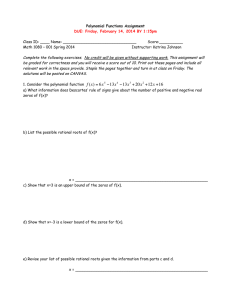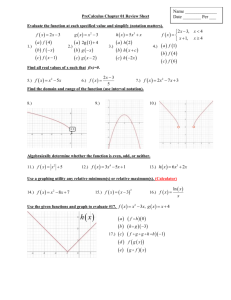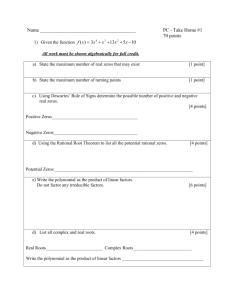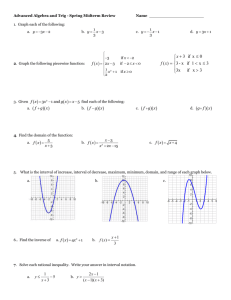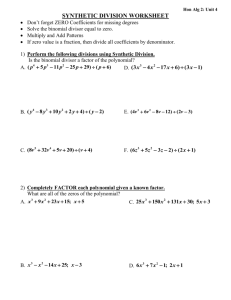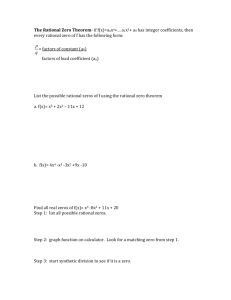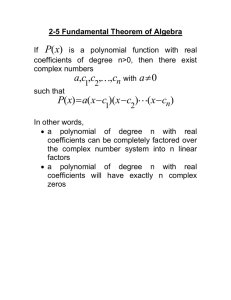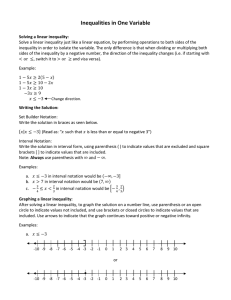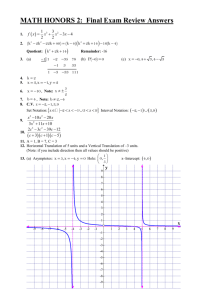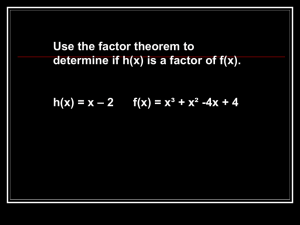1. Use the above graph to determine each of the following. Where
advertisement
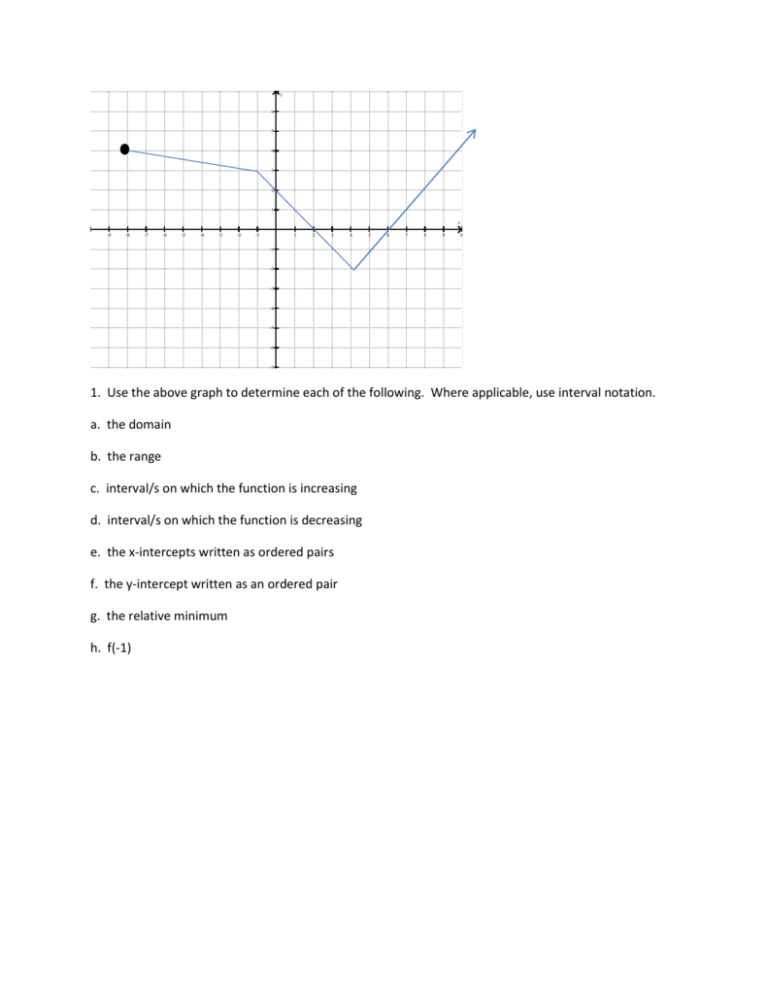
y x 1. Use the above graph to determine each of the following. Where applicable, use interval notation. a. the domain b. the range c. interval/s on which the function is increasing d. interval/s on which the function is decreasing e. the x-intercepts written as ordered pairs f. the y-intercept written as an ordered pair g. the relative minimum h. f(-1) x2 1 2. Graph f ( x ) x 5 if x 3 if 3 x 6 if x 6 y x 3. Find and simplify the difference quotient f ( x) f ( x h) f ( x ) , h0 h a. f ( x) 4 x 2 2 x 7 b. f ( x) 3x 2 c. f ( x) 3 2x 5 4. Divide using long division. Write the answer in the form q( x) r ( x) . d ( x) 4x4 4x2 6x x4 5. Divide using synthetic division. Write the answer in the form q( x) (5 x3 6 x 2 3x 11) ( x 2) r ( x) . d ( x) 6. Use synthetic division and the Remainder Theorem to find the indicated function value. f ( x) 3x3 7 x 2 2 x 5; f (3) 7. Use synthetic division to divide f ( x) 2 x3 5 x 2 x 2 by x 2 . Use the result to find all zeros of f . 8. a. List all possible rational zeros. [Problems on page 357 (9-24) b. Use synthetic division to test the possible rational zeros and find an actual zero. c. Use the quotient form part (b) to find the remaining zeros of the polynomial function. f ( x) 2 x3 3x 2 11x 6 9. Find an nth-degree polynomial function with real coefficients satisfying the given conditions. [Problems on page 357 (25-32)] n=3 4 and 2i are zeros f(-1)=-50 10. Find the domain of each rational function. Write in interval notation. ( Section 2.6) a. f ( x ) x 8 x 2 64 b. f ( x ) x3 x2 9 c. f ( x ) x7 x 10 11. Find the vertical asymptote. a. f ( x ) x 8 x 2 64 b. f ( x ) x3 x2 9 c. f ( x ) x7 x 10 12. Find the horizontal asymptotes. x4 x x6 a. f ( x) 2 b. f ( x) 13x3 6 3x 2 5 c. f ( x) 5 x3 2 x 2 5 3x3 2 13. Find the slant asymptote if there is one. x2 x 1 a. f ( x) x 1 b. f ( x) x3 x 2 8 x 6 5x 6 14. Find the domain, the intercepts, and the asymptotes, and use them to sketch the graph of f ( x) 3x x 1 y x 15. Solve the polynomial inequality f ( x) x3 7 x 2 x 7 0 . Graph the solution set on a real number line, and express the solution in interval notation. 16. Solve the rational inequality x4 0 and graph the solution set on a real number line. Express the x 3 solution set in interval notation. 17. Showing each of the four steps, find an equation for f 1 ( x). a. f ( x) x 5 b. f ( x) ( x 2) 3 c. f ( x) 3 x 18. Use the graph of f to draw the graph of its inverse function. y x 19. Write each equation in its equivalent exponential form. (section 3.2) a. logb38 = x b. 8 = log2w 20. Write each equation in its equivalent logarithmic form. a. 25 = 32 b. b3 =343 21. Find the domain of each logarithmic function. Write in interval notation. a. f ( x) log(7 x) b. f ( x) ln( x 6)2 c. f ( x) log( x 19) 22. Evaluate and simplify each expression without using a calculator. (page 438) a. log4 = 16 b. log7 = 1 c. ln 1 d. log446 e. log 100 23. Graph f(x) = 2x. Plot points. Then using transformations graph g(x)= 2x +3 24. Approximate each number using a calculator. a. 3-5.7 b. e4.5 25. Using you graphing calculator, find each of the following rounded to three decimal places for the function f ( x) 2 x3 5x 2 x 1 . a. the real zeros b. the relative maximum c. the relative minimum d. f(-6) r 26. Use the compound interest formulas A P 1 n nt or A Pe rt to solve. Round answers to the nearest cent. Find the accumulated value of an investment of $15,000 for 4 years at an interest rate of 5.5% if the money is a. compounded monthly b. compounded continuously
